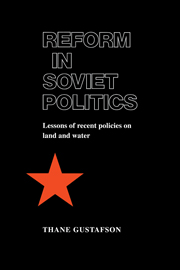Book contents
- Frontmatter
- Contents
- Preface
- Map of Soviet Russia showing major hydropower sites
- 1 Challenge of the third generation of Soviet power
- 2 Building authority around a new agricultural policy
- Part I Advice and dissent in the shaping of Brezhnev's agricultural and environmental programs
- Part II Implementation of the Brezhnev programs
- Notes
- Index
2 - Building authority around a new agricultural policy
Published online by Cambridge University Press: 04 August 2010
- Frontmatter
- Contents
- Preface
- Map of Soviet Russia showing major hydropower sites
- 1 Challenge of the third generation of Soviet power
- 2 Building authority around a new agricultural policy
- Part I Advice and dissent in the shaping of Brezhnev's agricultural and environmental programs
- Part II Implementation of the Brezhnev programs
- Notes
- Index
Summary
Nowhere is there a greater contrast between the first two Soviet generations and the third than in agriculture and the programs that support it. In effect, Stalin's priorities have been reversed. Agriculture no longer subsidizes industrial growth; instead, it is now industry that subsidizes agricultural reconstruction and modernization. At the beginning of the 1960s, nothing would have seemed less likely than such a drastic turnabout. The Soviet regime's bias against agriculture appeared built into the very structure of planning and administration. How then was the Soviet leadership able to change direction so dramatically?
The argument of this chapter is that the change took fifteen years of painful trial and error, a long learning period in which several things evolved together: the elite's attitudes toward agriculture, but also, at a deeper level, their views on natural resources, large undertakings, and on the complex demands of policy making in a mature industrial system. The gradual evolution of new policies suggests that another kind of learning was also taking place: how to build authority and agreement in a political system no longer inspired by fervor or (at least in everyday establishment politics) ruled by fear.
Officially, the new program dates from the March 1965 plenum of the party Central Committee, convened some five months after the fall of Nikita Khrushchev. At that session, one bitter speech after another repudiated Khrushchev's agricultural policies. His last desperate reforms, particularly one that divided the party apparatus into separate agricultural and industrial wings, were annulled. Within a year, agricultural reconstruction and reclamation began expanding phenomenally.
- Type
- Chapter
- Information
- Reform in Soviet PoliticsThe Lessons of Recent Policies on Land and Water, pp. 15 - 34Publisher: Cambridge University PressPrint publication year: 1981



